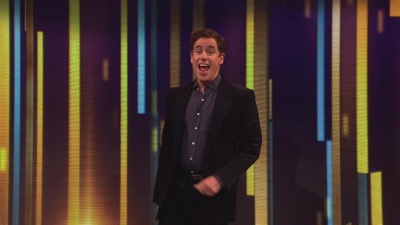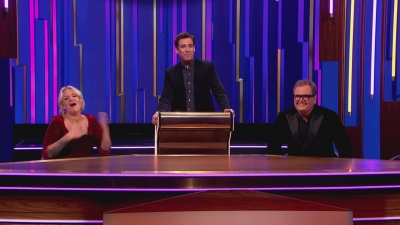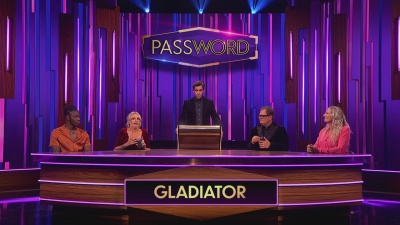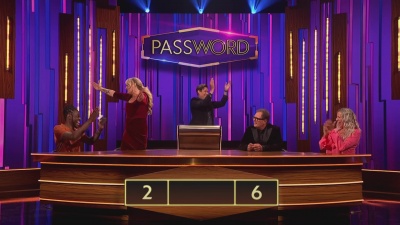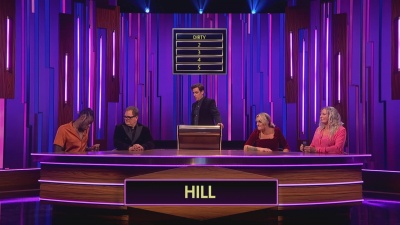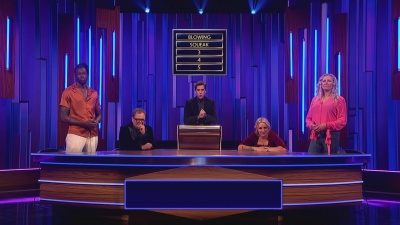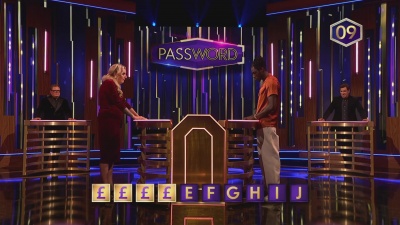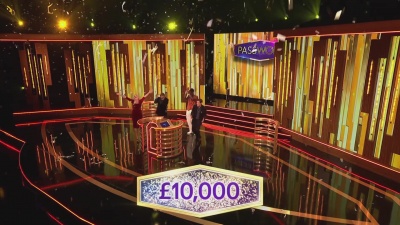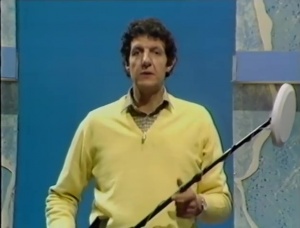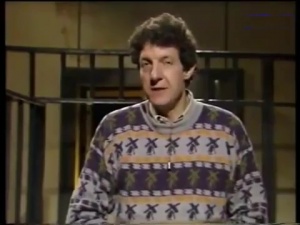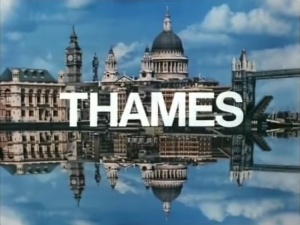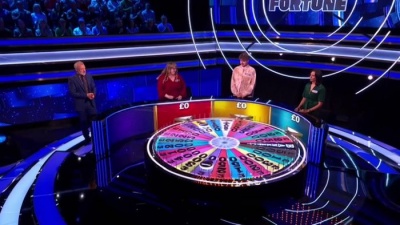Weaver's Week 2024-09-29
Last week | Weaver's Week Index | Next week
Basingstoke.
Contents |
Password
Talkback (part of Pearson Television (or whatever they're calling themselves this week)) for the ITV network, from 31 August
Our own A-Z entry gives the nub of the game:
- One person gives a one word clue and their partner has to try and guess from that what the password is. If they don't then their opponents get a go but for less points. Keep going back and forth until someone gets it; keep going to a certain amount of points are reached then something good is bound to happen.
Password is as old as the hills: the earliest recorded game is between the Catuvellauni and Trinovantes at Camulodunum in about 36 CE, hosted by Nicholas Parsons. Television versions knocked around the fringes of the schedule from 1963 until 1988 (SPOILER: 162 episodes in total, 63 primetime episodes. Oh.) It's appeared on all four major channels, and been hosted by greats like Gordon Burns, Brian Redhead, Tom O'Connor and Esther Rantzen. And it's not been on telly since 1988, so few people under 50 will remember it.
How does the new version stack up? Even before we meet anyone, there's some very jaunty and jolly music, the sort that brings to mind the most shallow and unimaginative cliché of a game show – or a spoof of a game show, sending itself up with the banal tune. Stock footage of London and a narration by Simon Greenall.
The host is another television great, Stephen Mangan from The Fortune Hotel and Postman Pat The Movie. "Welcome to Parseword, the brand new game show that's all about words." What's the most important part of the programme, what do they want to bring to our attention first? The prize. Of course it's the prize. £10,000 on a Saturday night. Just don't mention that players have been winning that much on The Answer Run in daytime.
To win the prizes, our civilian contestants will need some help. They've booked the finest in the business, Alan Carr and Daisy May Cooper. Carr is from the ITV drama Changing Ends and the ITV talent show Mamma Mia! I Have a Dream; Cooper comes from various BBC dramas. They have agreed to do a whole series across possibly as many as two weekends, no doubt influenced by a sizeable pay packet they'll receive whether they win or lose.
Now, we need to talk about the captains' entrance. They enter the set through a little recess at the back, so they can emerge into view, take a step forward, link arms or otherwise greet each other, and stride down the middle of the stage and the middle of our screen. Only they can't do that, because Stephen Mangan is standing in the middle of the stage, and they'd bump into him from behind. So we get lots of side-on angles of Daisy and Alan, some blurry footage of one walking past the host, before both sit down. Visually, it's a mess. Attention to little details makes a show great, and this column is rather narked that we can craft a better intro than the professional director.
The game would be nothing without contestants, and they walk on from the front of the stage, just in front of the audience. Spot the division between celebrities upstage, and the civilians downstage and in the hall. The celebrities introduce their team-mate, which is a pleasant touch. And there's a good deal of chatter, something over four minutes from the start of the show to Stephen beginning his explanation of round one.
"Get your partner to guess the parseword before your opponent does. You can only give one word clues; no made-up words, no hand gestures, no miming. If your partner gets the parseword on the first clue it's worth six points, then five points on the second clue and so on. First team to 25 points wins the round. Win two rounds tonight and you'll be playing for the £10,000 jackpot."
Hmm. Second mention of the jackpot in the first five minutes. Nobody mentioned that Tipping Point offers precisely twice as much every single day?
There is an accelerator – the "Boost" will permit just one clue, and ten points if the partner can guess the password straight away. But you can only use it once, and an error allows the other team has a chance to give one further clue, still for ten points.
No chance of playing along at home, we get a caption and a voiceover telling us what the right answer is. "The parseword is 'Gladiator'". (And there's another thing to annoy us – does nobody know how to say "pass", to rhyme with "class" and "grass" and "lass" and "mass".) Whoever's behind in the game has the option to play, or to parse; surely the correct decision is to remember the show's name and parse.
How does the game play out? Alan says "Contenders!" in an approximation of a Scottish accent. His playing partner shrieks, "Gladiators!" and gets the point. Password will accept plurals or singular forms, and reasonable inflections of a verb (play, played, playing; the response "player" might cause a problem).
Stephen hands over a little envelope concealing the password to whoever's giving the clues. When it's the civilians' turn to give the clues, that envelope is handed over behind the celebrity's back – absolutely no chance of cheating.
It quickly emerges that they're stretching this show out as far as it can go. Every decision of whether to play or pass is greeted with wild and rapturous applause, as though the contender has been through absolute agony in making their decision. By the end of the round, this gets very wearing indeed.
The important bits get lost amongst this constant racket: when a six-point answer is greeted with the same whooping and hollering as the decision to play, it loses a lot of its magic.
Judgement calls are made about whether clues are to be accepted: is "ugh" a real world? Not in the opinion of the producers. Does Daisy sometimes over-enunciate a bit? In the opinion of the producers, yes. Their judgements of the producers are final, the judgements of the producers tend to be noticeably harsher than this column would make. Mercifully, there's only about one foul per episode, any more fouls and we might be confusing this show with Match of the Day on the other side.
As one might expect from a show commissioned to go out after the 9pm watershed, there are a few risqué passwords, and some mildly smutty clues. Or, in the case of the first episode, Alan Carr saying "Bum" rather too much.
A few changes after the break, most notably that the captains have swapped from one contender to the other. The rules also change: we're now into Super Password territory, where the game wears its underpants outside its trousers. And that there's a link between all the answers in the round: get this to win the round at once, if nobody can spot the link after all five clues are revealed then the more points wins.
Password is a game of very variable length. The opening round will last at least four clues, most likely about eight. This second round can be solved in two clues, it could take five. We might be able to deduce how well the contestants will do from the show's edit – if there's a lot of chatter, the game will be taken to the limits; an inordinate amount of waffle suggests that the rounds might be dispensed with very quickly. In order to drag the game out even further, Stephen Mangan offers an "Ask the Host" lifeline, each team can ask him to give one of the clues. They're inviting comparisons with Who Wants to be a Millionaire, albeit with a far more likeable and trustworthy host.
Whatever happens, there's unlikely to be a tense finish, Password somehow manages to be devoid of tension even though it's offering £10,000 (or somewhat less than Channel 4's Moneybags).
With two rounds played, it is possible that one of the contenders will have won them both, and hence will be the night's winner. Or it is possible that each contender will have a round each, and a tie-break is needed. This is another of those Super Passwords, five words on a linked theme, first person to buzz in with the right answer wins. And, for reasons that might make some sort of sense, the contenders stand up for this round, having been sat down since they first came on stage.
The grand final is next, but first there's a Fake Ad Break. For those of us watching on linear telly, Password goes out in a 30 or 35-minute slot, and that only allows one internal break. It was originally commissioned for a 45-minute slot, but such is the quality of the programme and speed of play that much of the time has had to be jettisoned, and one of the breaks is filled with promos for other ITV programmes. No such fun for the poor unfortunates using the internet-based ITV Hub, who have to sit through at least two full-length commercial breaks and more if the Hub does its usual trick and crashes just before the end.
Stephen introduces the winning contender and reminds us that they can win £10,000. Or, as Stephen Mulhern on Deal or No Deal calls it, a middling red. The final round is 60 seconds of rapid-fire passwordery, half with Daisy, half with Alan. The answers are in sequence alphabetically, perhaps beginning with A, then B, then C, and so on.
There's £500 for each correct answer in this round, automatically doubled if the ten are completed within the minute. Fail to do so and the contender can still double their prize, they'll have to get one final password from a single clue provided by Alan and Daisy. This speed round is far more exciting than the rest of the show, and almost encourages us to mutter something towards the screen; why can't the rest of the programme be this much fun?
This series of Password was announced back in early June 2023, to air at some time in 2024. Frankly, this feels like something ITV have made, seen the edit and got cold feet, but will pop on air in a nothing-to-lose slot (after The Voice of ITV, opposite The News on BBC1) to see if it works.
For this column, it doesn't work. Password began as a properly low-stakes game, and remains a low-stakes game. It belongs on daytime television, played at double this pace for half the prize, or as one part in a longer suite of word-based challenges.
Viewers may share our vision of what they want to see, but viewers know what they don't want to see. Password has seen ratings fall through the floor, apparently from a disappointing 1.3 million for the opening episode, to little more than half a million last Saturday night. This, er, doesn't look good for a second series.
Chris Serle
Sorry to hear that Chris Serle has died; he was 81. Best-known for his work on That's Life opposite Esther Rantzen, Chris was the tall gangly one with a faint west-country accent, the one who was always going to make a fool of himself. Later, he would make a fool of himself on the early reality show In at the Deep End, where he would take on a new job for which he was completely unskilled – hairdressing, auctioneering, bookmaking, ballroom dancing, and yacht racing.
Chris first crossed this column's radar in the early 1980s, when he was the new microcomputer user on The Computer Programme and Making the Most of the Micro, gently educated in basic BASIC by Ian McNaught-Davis. He then inspired us with the Sunday morning treat Windmill, dipping into the various programmes held by the BBC archives and setting them into some sort of context.
In the world of game show, Chris hosted the first series of Runway for ITV, was a regular on Radio 2's Monday Movie Quiz, and was never going to overshadow the competitors on World's Strongest Man. Before making his front-of-camera debut on That's Life, Chris had been a producer on shows such as Parkinson and a wish-fulfilment programme. He produced the quizzes Right or Wrong? (1971-2), Three in a Row (1972-4), Beat the Record (1973) and BBC Brain (1975).
After leaving That's Life, Chris was the regular host on Radio 4's Pick of the Week, reprising the best of the BBC's broadcasting in one easy-to-hear package. Following his experience on In at the Deep End, Chris went on to become a very good yachtsman – he presented a regional show for ITV, and sailed a couple of legs of the Round the World yacht race in 2001. Throughout his career, Chris represented the ordinary person on screen, no airs, no graces. His natural warmth and expressive eyebrows helped to communicate.
Chris Serle was someone we could trust, a friend on the screen.
In other news
Oh, would you make your minds up? This column is old enough to remember when Thames and Talkback were separate companies; indeed, we're just about old enough to remember when Talkback was independent of Pearson Television (or whatever they're calling themselves this week. Fremantle? Whatevs). After merging Thames and Talkback into TalkbackThames in 2003, Pearson Television (or whatever they're calling themselves this week) split the companies again in 2012. Such is the need to impress their shareholders that Pearson Television (or whatever they're calling themselves this week) will again merge Talkback and Thames into TalkbackThames 2.0.
The current chief executive of Pearson Television (or whatever they're calling themselves this week) released a press statement that was long on corporate waffle and management guff, and short on any message that might be communicated to viewers. Perhaps Pearson Television (or whatever they're calling themselves this week) might spend less energy moving the deckchairs, and put more effort into making great television.
Spin me in again ITV has commissioned another series for Wheel of Fortune hosted by Graham Norton. We hope that it's better than the first series, Graham gets someone to bounce off, the puzzle board isn't so shiny, there's some proper progression through all the rounds, and they remember the star of the show is the wheel not the puzzle. We want to see winners, not people spelling out Answer Smashes. Nine episodes and one celebrity special, don't forget to miss it.
Supply DJ shenanigans Vernon Kay had a bit of a sore throat this week. Monday's show on Radio 2 was mostly narrated by listeners' voice notes and Vern's producer, in the hope that he might save his voice. By Tuesday, he was completely unable to come to the studio, and had to be replaced by Gaby Roslin. Ten to the Top, the usual pop music quiz, couldn't go out so Gaby cobbled together a quizette about classic children's television. Just right for the audience, bringing definite "teacher who's been parachuted into a lesson they know nothing about" energy, and being live radio things that could go wrong did go wrong. All goes to remind us how well Ten to the Top is prepared, and produced, and fits into a slick and pacy show.
Quizzy Mondays
James Waller and Mike Noyes won on Mastermind. James took the films of Martin Scorsese, and many of the questions fell outside his wheelhouse; a good general knowledge in a low-scoring week secured the victory. Mike came through another low-scoring heat, with some very long pauses in his round on Horatio Nelson, and what seemed some easy points dropped in the general knowledge – but then this column cannot criticise hard because we've never made it to the black chair.
"Have we made the quiz too easy?" Words never previously spoken on Only Connect, where the Bloomsbury Group won a fantastically high-scoring episode, beating the Tea Totallers by 29-26. Highlights included the digits of pi reversed, hosts of Catchphrase mixed with the show's catchphrase, and a quick burst of the Frog Chorus. But mostly the joy of six highly-qualified quizzers making mincemeat out of some high-quality questions.
Lower scores for the Introverts, who beat the Third Agers 22-18. "Synonyms for 'Mighty Morphin Power Rangers'" was one answer, "of course it is," the unimpressed reply. Third Agers might have overthought a question about tennis grand slams – confusing them with badminton courts. Introverts knocked out pictures of things ending -berry, and found anagrams of fruit in their wall.
Two-thirds of the Bloomsbury Group were part of the Imperial College team who won University Challenge two years ago. Imperial's 2025 team made mincemeat of the opposition, beating Manchester The Team Everyone Wants To Beat by 310-75. Imperial had a 71% overall accuracy and 71% bonus rate, vying with Bristol and Queen's Belfast as the most right teams of the still young series.
The other third of the Bloomsbury Group was on the Reading side from University Challenge two years ago; this year's side lost to Exeter by 240-100. Another strong performance, 71% overall accuracy and 73% bonuses, leaping to a 95-0 lead after the picture round. Exeter very strong on art and literature, and surprisingly few history questions came off the pile.
Great news for all detectives, The Traitors New Zealand is on I-player and BBC3 (Mon). Great news for hidden-camera fans, Big Brother kicks off a new series (ITV2, Thu; contestants arrive next week). Next Saturday has movie night on Strictly Come Dancing (BBC1), Les Dennis on Stephen Mulhern's Celebrity Catchphrase (ITV), and Mollie and Harry from The Traitors meet on The Weakest Link (BBC1).
To have Weaver's Week emailed to you on publication day, receive our exclusive TV roundup of the game shows in the week ahead, and chat to other ukgameshows.com readers, sign up to our Google Group.


